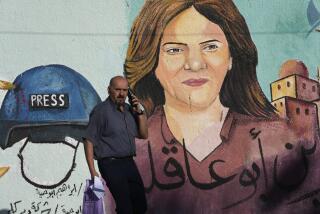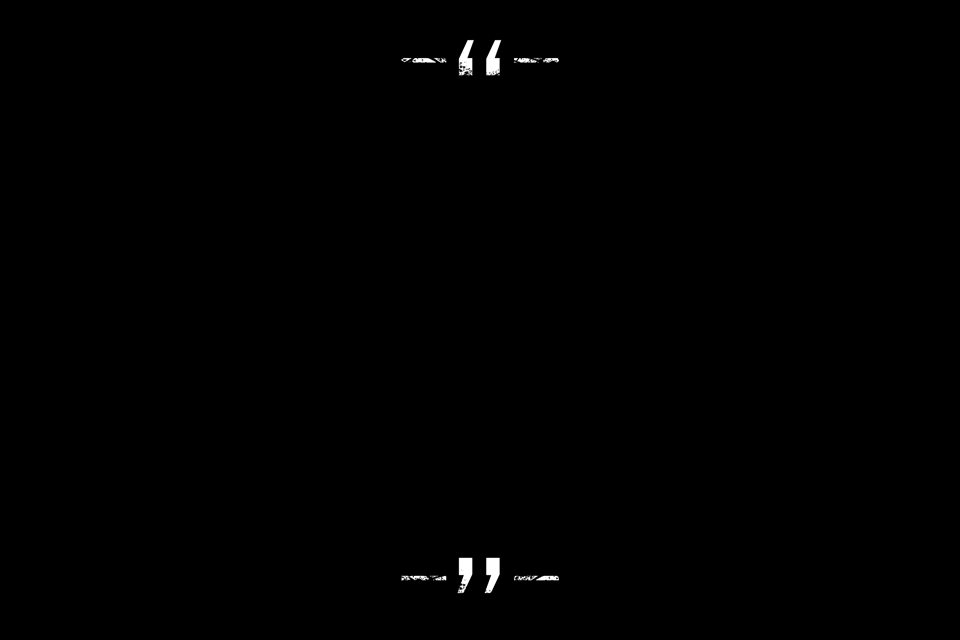Missing in Action So Far: Murrow’s On-Air Eloquence
- Share via
In the days since American television screens erupted with news of war in the Persian Gulf, the name of Edward R. Murrow, the patron saint of electronic journalism, has been invoked often, and reverently.
Murrow’s memory has been brought up in comparisons between newscasts out of Iraq and Saudi Arabia and those historic broadcasts Murrow made for CBS Radio during World War II.
“This is the most dramatic reporting we’ve had since Murrow stood on those rooftops in London,” one CNN anchor said as that network’s correspondents--John Holliman, Peter Arnett and Bernard Shaw--phoned in their exclusive reports during the early hours of the first allied bombing of Baghdad.
Others have echoed the sentiment, but I find myself among the unpersuaded.
Yes, the reports, especially those first ones from Baghdad that came in without video accompaniment, were powerful. And I’ve frequently found my heart trying to leapfrog past where my tonsils used to be at each new bulletin about Scud missile launchings, Patriot anti-missile-missile firings or an F-16 downed in the Arabian desert.
But from what I’ve seen and heard, it has largely been the facts, not the reportage, that has stirred my emotions.
All you have to do to see the gap between the class of ’91 and Murrow is to dig up a tape or transcripts of his war reports; the best source may be “In Search of Light--The Broadcasts of Edward R. Murrow, 1938-1961,” published in 1967.
What set him apart--make that, above--the field half a century ago, and still does, was not just the inherent drama of sending live reports from another continent as bombs dropped in the background. It was also his unparalleled skill with language and his solid grasp of the history that was unfolding around him.
Tune to CNN or any of the Big Three networks for live TV coverage, and most likely you’ll hear correspondents reporting that sirens are wailing (as you hear the sirens wailing) and that missiles are being launched (as the “whoosh!” of an unseen projectile is heard whizzing over their heads). Raw, undigested information.
Compare that to Murrow’s report from London the night that the Germans began their unprecedented blitzkrieg bombing in 1940:
“The fires up the river had turned the moon blood red. The smoke had drifted down till it formed a canopy over the Thames; the guns were working all around us, the bursts looking like fireflies in a southern summer night. . . . Huge pear-shaped bursts of flame would rise up into the smoke and disappear. The world was upside down. . . .
“It was like a shuttle service, the way the German planes came up the Thames, the fires acting as a flare path. Often they were above the smoke. The searchlights bored into that black roof, but couldn’t penetrate it. They looked like long pillars supporting a black canopy. Suddenly all the lights dashed off, and a blackness fell right to the ground.”
After London had been pounded for about as long as U.S. and allied forces have been pummeling Iraqi targets now, Murrow assessed the impact of the relentless attacks in a way that no Pentagon “bomb damage assessment” could approach:
“There are no words to describe the thing that is happening,” Murrow said via shortwave radio to his CBS Radio audience back home. “A row of automobiles, with stretchers racked on the roofs like skis, standing outside of bombed buildings. A man pinned under wreckage where a broken gas main sears his arms and face. . . . But you can have little understanding of the life in London these days--the courage of the people, the flash and roar of the guns rolling down the streets . . . the stench of air-raid shelters in the poor districts. These things must be experienced to be understood.”
Not to downplay the bravery of the reporters who are putting their lives on the line every hour that this war continues, but where’s that kind of reporting from the Persian Gulf? We’re getting reams of information. Murrow specialized in providing meaning .
There are a variety of reasons why this is so--some good, some not so good.
Foremost is that Murrow was uniquely equipped as a newsman. His family history, education and experience gave him a foundation few broadcasters since can match, let alone surpass.
Second, the world of politics and of journalism has changed drastically in the 50 years since the golden age of war correspondents.
George Mastroianni, professor of communications at Cal State Fullerton, said: “We’re in an age now where the reporter wants to be more conversational; they’re not trying to be wordsmiths as much as Murrow tried to do.
“You go back and read Murrow’s lines, and you see they were very clearly thought out. He really paid attention to the rhythm of the words. The prose was very dramatic. We’re in a different era of reporting now.”
A key part of that difference is the sheer bulk of information that is being issued from the gulf, as well as related points around the world. Murrow gave his news reports nightly. They were delivered live, but generally they were written before he went on the air. And he certainly wasn’t called to the microphone every time a bomb was dropped, the way TV reporters are in the gulf conflict.
“There are so many more deadlines now,” Mastroianni said. “It’s hard to be a Pulitzer Prize winner every time a Scud comes in.”
Terry Bales, head of the telecommunications department at Rancho Santiago College in Santa Ana, noted that the peril ante has been raised considerably since Murrow’s day:
“I’ve listened to Murrow tapes quite a bit, and I always use them in my classes as an example of great reporting. Sure, he was under danger, but these guys (in the Middle East) have carried that to an extreme with the chemical weapons Iraq has.”
Still, Bales agreed that “overall, no one has given quite the words-eye view of the war that Murrow did.”
Bales cited the TV reporter’s reliance on the camera to deliver pictures of the news scene and said he emphasizes to his students the responsibility every reporter has to tell the full story in their own words, minus the crutch of video.
And there was one more critical distinction in perspective that Murrow held, one I submit that reporters would do well to keep in mind as the war wages on.
“I spent five hours this afternoon on the outskirts of London,” Murrow reported in August, 1940, shortly before the blitzkrieg was launched. “Bombs fell out there today. It is indeed surprising how little damage a bomb will do unless, of course, it scores a direct hit. But I found that one bombed house looks pretty much like another bombed house.
“It’s about the people I’d like to talk, the little people who live in those little houses, who have no uniforms and get no decorations for bravery. . . . To me those people were incredibly brave and calm. They are the unknown heroes of this war.”
Those are the reports I keep waiting to hear out of Iraq, Kuwait, Saudi Arabia, Israel and wherever else the bombs do their bloody work.
But journalism has changed, technology has changed, audiences have changed, weapons of destruction have changed. The only constant, as Murrow himself would have pointed out, is war itself.
More to Read
Sign up for Essential California
The most important California stories and recommendations in your inbox every morning.
You may occasionally receive promotional content from the Los Angeles Times.













